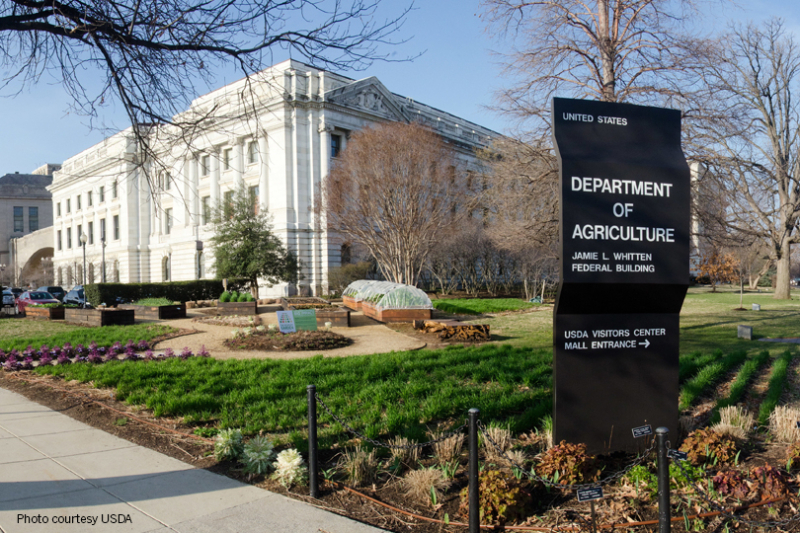By Jessica Domel
Multimedia Reporter
The U.S. Department of Agriculture (USDA) will not implement or process disaster assistance payments or implement changes to farm bill programs approved through the One Big Beautiful Bill Act, HR 1, during the government shutdown.
USDA released its 55-page plan for the shutdown on Tuesday, outlining the programs and services that will remain available and those that will shutter until Congress can come to an agreement on how to fund the government in the new fiscal year.
The plan includes the furloughing of 42,256 of USDA’s 85,907 employees.
U.S. Secretary of Agriculture Brooke Rollins posted on X the shutdown is hitting rural America hard.
“On the eve of one of the worst farm economies, America’s producers are left stranded,” Rollins said.
She pointed to programs that will cease during the shutdown, including billions in disaster aid, Rural Development activities, trade negotiations, animal and crop research and food safety research.
“Farmers don’t get to shut down,” Rollins posted.
According to USDA’s plan during the shutdown, select Farm Service Agency (FSA) leadership at headquarters and at state offices will be on call to ensure the continuity of operations in the event a natural disaster response is needed and to ensure the security interest of the Commodity Credit Corporation.
If the shutdown lasts longer than 10 days, a farm loan employee or a county office farm program employee per service center will be on call to complete certain loan processing tasks.
FSA will not, during this time, implement and process remaining Supplemental Disaster Assistance (SDRP) programs, stages one or two, Emergency Livestock Relief Program (ELRP) 2023 and 2024 for Flood and Wildfire, block grants and any outstanding payment modifications for the Emergency Commodity Assistance Program (ECAP).
FSA will also not implement or process disaster assistance program payments in support of significant weather-related losses.
Annual Conservation Reserve Program (CRP) payments, Agriculture Risk Coverage (ARC) and Price Loss Coverage (PLC) payments will also not be processed, per the shutdown plan.
FSA will not develop and implement the changes made to ARC/PLC base acres, disaster assistance program policy updates, marketing assistance loan repayment calculations and Dairy Margin Coverage (DMC) payment updates approved in the One Big Beautiful Bill Act.
U.S. House Agriculture Committee Chairman Glenn (GT) Thompson (R-PA) said the government shutdown puts critical USDA services in jeopardy.
“These political games harm rural America through disruptions to farm payments, disaster relief, food assistance and other critical services,” Thompson said.
The majority of activities at USDA’s Risk Management Agency, Natural Resources Conservation Service, Foreign Agricultural Service, Food and Nutrition Service, National Institute of Food and Agriculture, Economic Research Service, National Agricultural Statistical Service, Rural Development and staff office activities will cease during the shutdown.
The USDA website will not be updated.
USDA will also not be able to work on tasks related to: technical assistance, contracts and agreements not related to exempted programs, financial management beyond funds management, regulatory work, trade negotiations, timber sales, hazardous fuels treatments, special use permits, long-term studies and research on animal diseases, research and report publications and data products.
The department will continue certain farm loan processing items, select natural resource and conservation programs, core nutrition safety net programs, essential food and safety operations (including food inspections and lab work), preparing for and responding to wildfires, activities supported by user fees, animal and plant health emergency programs and Section 521 rental assistance program outlays for prior obligations.
Texas Farm Bureau (TFB) President Russell Boening urged Congress to work together to get the federal government funded and functioning.
“From rising input costs to volatile markets, producers are already navigating significant economic uncertainty,” Boening said. “We cannot afford disruptions to critical USDA services, including those that support disaster assistance, conservation programs and animal health surveillance, especially as we monitor threats like the screwworm, which could devastate livestock operations.”
Boening said farmers and ranchers need more certainty, not more delays.
The U.S. House of Representatives passed a short-term government spending package to fund the government through Nov. 21 in mid-September.
That bill, and a bill proposed by Democrats to fund the government for a few more weeks, both failed to garner the 60 votes needed to pass the U.S. Senate Tuesday, with lawmakers from both parties placing the blame firmly on the other side.
The Senate is slated to be out-of-session Thursday for Yom Kippur. The chamber is expected to be back in session Friday.
The last government shutdown, the longest in history, lasted 35 days—from Dec. 11, 2018 to Jan. 25, 2019.


Leave A Comment